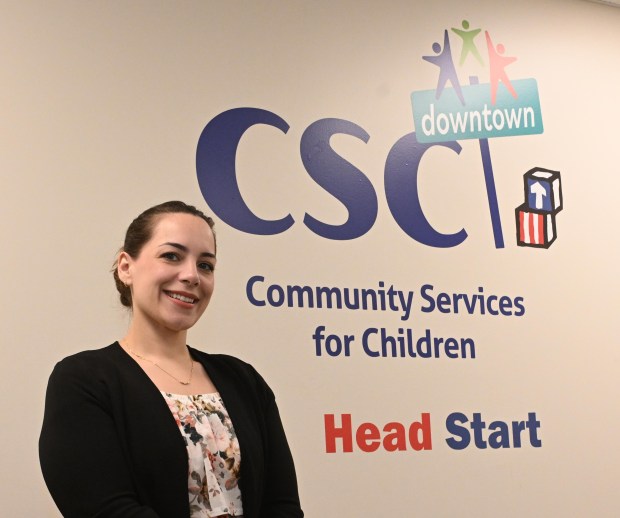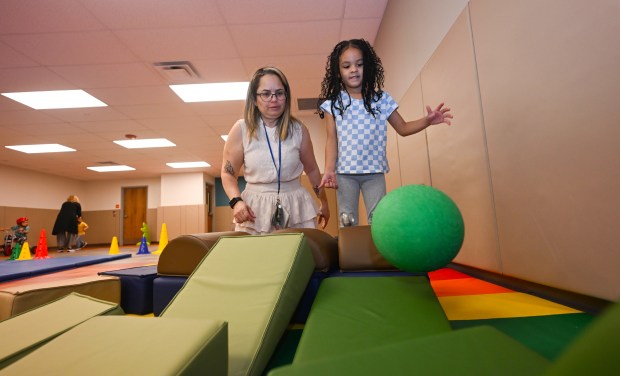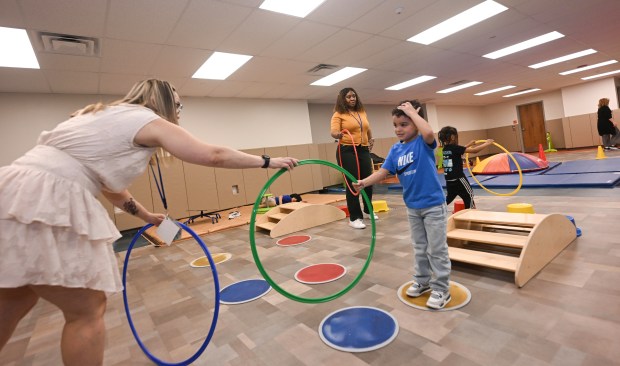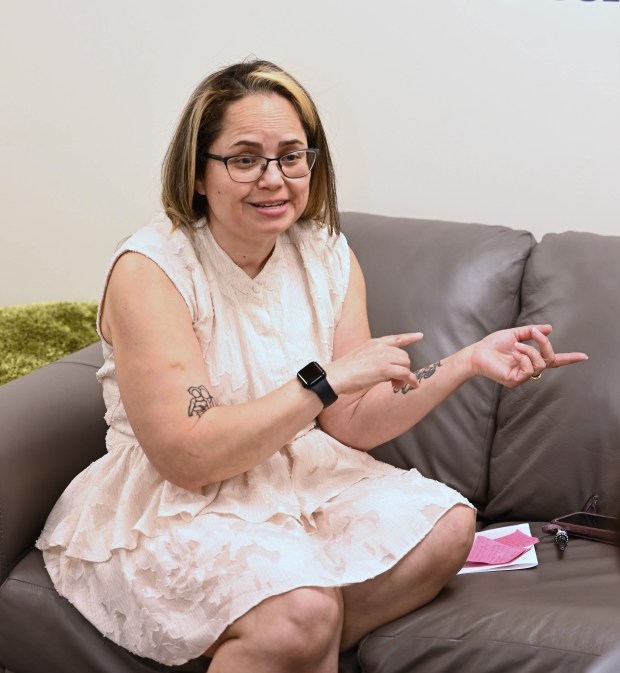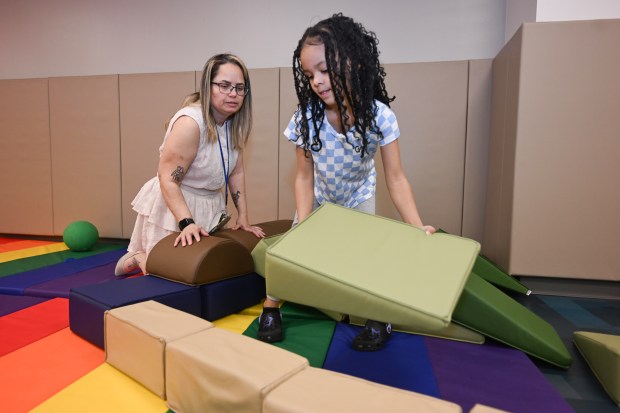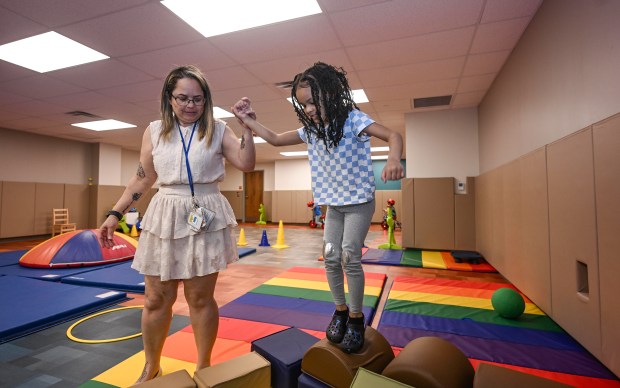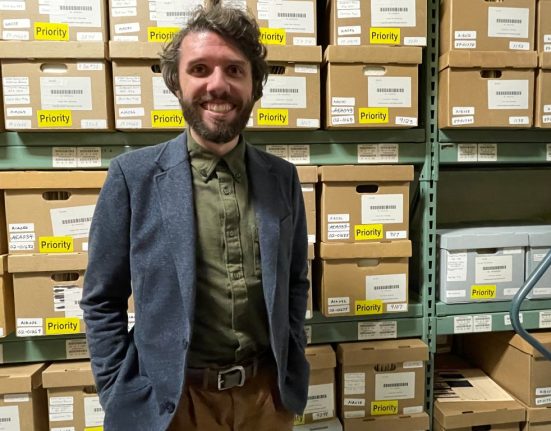Amanda Cruz doesn’t limit her conception of Head Start to federally funded preschool. For her, it means Franklin Park playgroups for her son, home visits for her daughter and community connections to things like a dentist and cooking classes.
Head Start and Early Head Start are provided by Community Services for Children to Cruz and more than a thousand other Lehigh Valley parents. Documents leaked last month indicated the programs could be eliminated in upcoming federal budget negotiations, but a reversal from the administration appears to have left the programs on firmer ground. However, staffing cuts and communication delays continue to raise concerns.
Head Start, which provides preschool services for 3- and 4-year-olds, and Early Head Start, which offers support services to pregnant women and families with infants and toddlers, target families at or below the poverty line — set at $32,150 for a family of four.
Local Head Start/Early Head Start provider CSC enrolled 856 Lehigh County children and 388 Northampton County children for the 2024-25 program year.
The weekly Early Head Start home visits that track her nearly 1-year-old daughter’s developmental milestones double as “free therapy,” Cruz said, explaining that the visits lend her confidence and prevent her from becoming overwhelmed by the conflicting parenting advice she’d have to navigate on her own without that support.
Her 4-year-old son, an Early Head Start graduate, is on the waitlist for preschool classroom services, but CSC playgroups and community events have been a crucial source of social interaction and educational development, Cruz said.
The program’s emphasis on life skills benefits both parents and children, Cruz said. Cooking classes not only provided her with recipes but also helped her lean into her son’s interests in the kitchen. She’s equipped him with his own set of plastic knives so he can chop vegetables and food as they meal prep.
“They empower parents and caretakers and children to strive to meet their goals — to set goals — and to be the best person they can be,” Cruz said. “It’s so much about community and relationships and family — and education. Not just education or child care.”
Providers seeking clarity
The network of local Head Start providers has seen a chaotic start to 2025, marked by communication delays and a lack of clarity regarding funding.
Staffing cuts and the closure of half of Head Start’s regional offices across the country have slowed communication to local providers. Pennsylvania’s regional office is open, but CSC CEO Deidra Vachier said it’s been difficult to know who to contact with questions and staff members who can be reached often don’t have answers.
News about staff cuts and office closures has trickled out through social media, Vachier said, noting that the lack of clarity is “just causing more chaos and certainly a level of anxiety with program leadership and with staff.”
Procedures for drawing down funds have changed, Vachier said, noting that CSC must now provide line-by-line documentation of spending on items such as food for children’s meals, fuel for transportation and classroom supplies. In the past, expenditures were described in grant applications and further documentation was not required to access the payment management system.
Mid-April reports from both USA Today and the Washington Post cite leaked budget proposals that indicated the White House plans for fiscal year 2026 would eliminate all funding for Head Start. However, the Trump administration’s budget proposal released May 2 did not include Head Start among the list of programs to be reduced or eliminated.
“While we are grateful and cautiously optimistic that Head Start was not eliminated in the administration’s initial ‘skinny’ budget proposal, we remain at high-alert until a funding bill that protects Head Start is passed by Congress and signed by the president,” Vachier said in a follow-up email.
Funding from the U.S. Department of Health and Human Services accounts for a little more than 30% of the CSC budget, with the current allocation for Head Start coming in at $13.2 million, Vachier said.
CSC’s grant from HHS runs April 1, 2025, to March 31, 2026, but federal budget negotiations mean funds have only been allotted through September.
Replacing that money would be a nearly impossible fundraising task for CSC, Vachier said.
“Is there a Plan B?” Vachier said. “There really isn’t at this point.”
Head Start received a $12.27 billion allocation for fiscal year 2024 and the National Head Start Association calculated that funding would cover more than 750,000 children in Head Start and Early Head Start programs nationwide.
A mid-April report from the U.S. Senate Committee on Appropriations said delays in disbursing funds were stretching local providers’ budgets and forcing closures.
On May 1, the Bucks County Intermediate Unit Head Start and Early Head Start programs announced they would shut down at the end of the month due to a lack of response to their grant renewal application. A one-month extension, announced May 3, will allow the programs to keep operating through June 30.
Closure of the Bucks IU Head Start and Early Head Start programs would affect 362 enrolled children, their families, and the Bucks IU program’s 85 staff members, their news release states.
The Bucks IU Head Start program began in 2015. Its latest five-year grant renewal totaled approximately $29 million, with $5.8 million allocated annually.
As the Bucks IU awaits a decision on its five-year grant renewal application, it issued a news release stating the Office of Head Start indicated more communication may be coming in the next few weeks, with a final decision expected by the summer.
HHS did not return a request for comment.
Head Start’s Lehigh Valley impact
Head Start began in 1965 and expanded into Lehigh and Northampton counties in 1967.
The latest CSC annual report notes that 15% of Lehigh Valley children live below the federal poverty level.
Head Start and Early Head Start don’t have the funds to cover local need, with only 16% of eligible Lehigh Valley children enrolled in Head Start and 6% of eligible families receiving Early Head Start programming, Vachier said.
Pennsylvania’s preschool program, Pre-K Counts, is available for families who earn up to 300% of the federal poverty level.
Asking Pennsylvania to expand its preschool program to cover all the students enrolled in Head Start would be “one huge ticket,” Vachier said, noting that CSC’s preschool programs — including Head Start, Early Head Start and Pre-K Counts — have almost 1,000 children on the waiting list.
The nation’s economic slowdown is affecting how much money Pennsylvania has to spend, so federal cuts to education programs leave the state with no practical or realistic way to backfill the money, said State Rep. Peter Schweyer, D-Lehigh, chair of the Pennsylvania House Education Committee.
With a state budget due in June, and the federal government not scheduled to finalize budget negotiations until September, state lawmakers have limited options to plan ahead, not knowing whether a massive cut to Head Start will actually happen, Schweyer said.
Having safe, quality child care matters not just for children’s development but also for parents’ ability to work, Schweyer said.
“If they want to get rid of it, I mean, they can — but it’s going to be extremely detrimental to human beings, the families and to the business community as a whole,” Schweyer said.
The office of U.S. Rep. Ryan Mackenzie expressed strong support for maintaining Head Start funding.
“Because of the work of Congressman Mackenzie and others on the House Committee on Education and Workforce, Head Start will be funded in the next budget. Congressman Mackenzie has proven his commitment to fighting for working families throughout our region, including by introducing legislation to deliver tax relief for parents and by co-leading a bipartisan effort to expand access to nutritious meals offered through programs like Head Start,” communications director Arnaud Armstrong said in an email.
As a project manager for Goodwill, Cruz has flexible hours and is able to work out of her home office. She knows that’s not the case for all Head Start parents. In her role on the Parent Policy Council, she’s seen how the organization provides resources to a wide range of caregivers, including single mothers, single fathers and foster parents.
The elimination of Head Start’s child care and educational options could ultimately cost a lot of people their jobs and have a devastating effect on their lives, Cruz said.
“I can’t imagine what some of these families would do, whether they would rely on older children or unqualified people to take care of their children while they worked, or if they would quit their jobs,” Cruz said. “Either way, it seems like danger to our community.”
Cruz said she’s priced out private child care and educational options and they’ve run between $800 and $1,500 a month to enroll one child. Some quotes came in higher than her mortgage.
Enid Marrero, a lead teacher at CSC’s downtown Allentown location, started to assess her options in the job market upon hearing of potential Head Start cuts. Taking a day care job could easily mean a wage drop of $17 an hour and the need to take on additional jobs, she said.
“It’s insane,” Marrero said, “and I worked hard. I worked hard to be all the way up here where I’m at.”
Marrero has been a Head Start educator for 27 years. She was recruited into the teaching side after serving as a parent volunteer and has since earned a bachelor’s degree in early childhood education.
“I feel like it’s my calling,” Marrero said. “I originally went to school for electronics — I wanted to be an electronics engineer — but being in the classroom with my son back then, it really sparked an interest in being with kids. And I just love it.”
Marrero was 21 and living in a Bethlehem Housing Authority residence when a program representative knocked on her door and offered Head Start placement for her then 3-year-old son.
Enrolling in Head Start meant her son received screenings and a diagnosis of a speech delay. Watching him get the resources he needed to flourish as a student has made it easier for her to counsel other parents.
“This is how they helped me,” Marrero said. “It’s not about labeling — it’s about your child succeeding.”
Head Start and Early Head Start focus on health, nutrition and emotional development. Children learn key routines, such as how to clean up after meal times and how to focus during story time. Without that socialization, entering a large kindergarten class can be overwhelming, Marrero said.
“It’s almost like throwing them in the pool of water and not being able to swim,” Marrero said.


